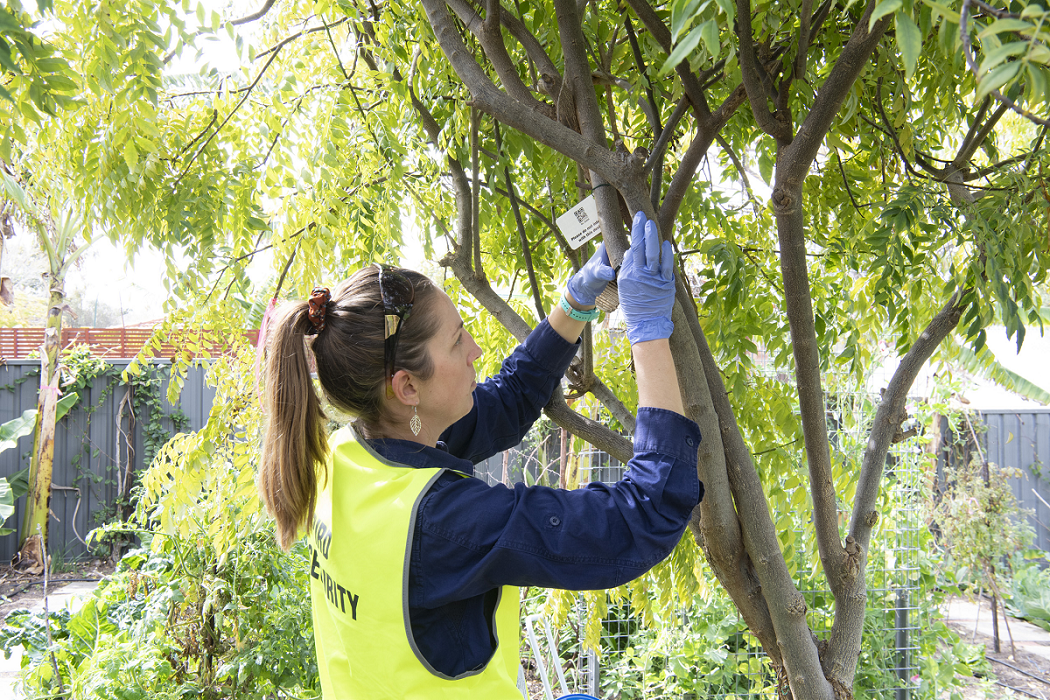
Department of Primary Industries and Regional Development (DPIRD) acting Chief Plant Biosecurity Officer Vincent Lanoiselet said despite the cooler temperatures Queensland fruit fly (Qfly) and polyphagous shot hole borer (PSHB) remained active.
“While Qfly and PSHB activity does slow somewhat during the cooler months, the mild Perth temperatures are still warm enough for these serious exotic pests to proliferate,” he said.
“Winter fruits like citrus are susceptible to Qfly as the pest takes refuge on the underside of evergreen trees, where it can be two to three degrees warmer than air temperature.
“PSHB activity is not likely to slow down with a moderate winter forecast so we expect these wood borers to still be active, as we saw last year.
“Winter storms can make PSHB detection easier as infested trees can lose limbs – making it a good time for residents and businesses to inspect trees for signs of borers.”
Quarantine Areas remain in place for both Qfly and PSHB, requiring affected residents and businesses to adhere to movement restrictions to stem the spread of these pests.
Dr Lanoiselet said the Qfly Quarantine Area included movement conditions within a 1.5 kilometre radius of the Bayswater detection.
“Residents and businesses in this Corrective Action Zone cannot move home grown fruit and fruiting vegetables, like tomatoes, chillies and capsicums, out of or within the area, unless cooked, frozen or solarised,” he said.
"Unmwanted fruits and fruting vegetablesl can be treated by cooking, freezing or solarising before being disposed of in general waste bins.
“Ripe or ripening fruit and fruiting vegetables from home gardens must be picked regularly and all fallen fruit removed every three days and cannot be moved within or outside the zone unless treated.”
More than 70 DPIRD officers continue to survey the area, while the permanent early warning Qfly surveillance grid has been supplemented with additional traps near the detection point and high risk areas.
Dr Lanoiselet said the Quarantine Area for PSHB was also in place for 25 local government areas across most of the metropolitan area, where department officers continued to survey for signs of the tiny borer.
“It is very important that wood and green waste material is not moved outside of the Quarantine Area to ensure the borer doesn’t spread,” he said.
“With camping popular at this time of the year, we remind people to purchase firewood locally and to ‘buy it where you burn it’ to minimise the risk of spreading PSHB.”
Dr Lanoiselet said with the International Day of Plant Health 2023 approaching on 12 May, it was a good reminder that everyone plays a role in defending the State from the impact of pests and diseases.
“Plants are integral to our very being, providing food, shelter and oxygen to survive,” he said.
“Biosecurity is everyone’s business – industry, government and community – and the public makes an important contribution as a first line of defence, which is essential to an effective and efficient response.”
Any suspected PSHB or Qfly activity should be reported immediately to DPIRD via the MyPestGuide® reporter app or its Pest and Disease Information Service on (08) 9368 3080 or email padis@dpird.wa.gov.au.
For more information on the bisoecurity responses and Quarantine Area requriements is available on the Qfly and PSHB webpages.
DPIRD will have information on hand on Qfly and PSHB, as well as other pests and weeds at the Perth Garden & Outdoor Living Festival on 11-14 May 2023 in the Nursery & Garden Industry WA marquee.


